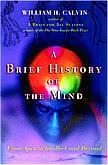| Type: |
Speaker |
| Event: |
The Nascent Learning Mind |
|
| Presenter's Name: |
William H. Calvin |
| Presenter's Address: |
Psychiatry & Behavioral Sciences Box 351800
Seattle, WA 98195-1800 United States |
| Authors: |
William H. Calvin, University of Washington,
Seattle |
| Abstract Title: |
The Evolution of Human Minds:
The Ice Age Emergence of Higher Intellectual Functions |
| Abstract: |
We all assume that bigger brains are better,
yet our ancestors went through several million-year-long periods
when toolmaking techniques didn't improve, despite a lot of
brain size increase. Even after our species, Homo sapiens, was
walking around Africa 162,000 years ago, we spent the next
100,000 years doing more of the same.
But gradually getting more clever is NOT what the 2.5 million
year bigger-brain increase was all about. If those ancestors
were getting better and better (maybe for something that doesn't
show in the archeological record such as short-sentence
protolanguage or more extensive sharing), it didn't feed back to
improve toolmaking, long-distance trade, or even using bone as
raw material for toolmaking (surely the handy-to-hand raw
material at any campsite). Oops.
The burst of creativity (since maybe 75,000 to 50,000 years ago)
is what we moderns associate with intelligence and our kind of
consciousness. It's probably the emergence of the suite of
higher intellectual functions: syntax, multi-stage planning,
structured music, chains of logic, games with arbitrary rules,
and our fondness for discovering hidden patterns (the search for
coherence). It's likely that they share some neural machinery
for handling structure and judging coherence.
If you can't speak sentences of more than 2-3 words at a time
without them all blending together like a summer drink, you
likely cannot think complicated thoughts either -- where you
also have to resolve the ambiguities and improve the quality of
the ensemble offline. That takes an ability to structure
thoughts, what you also need to speak long sentences or
recursively nest clauses. ("I think I saw him leave to go
home.") And without quality bootstrapping aiding structuring,
you can't be a poet who creates ensembles where every word
resonates with the rest, just so. |
| Created: |
10/05/2004 08:10:14 EST |
| Last Modified: |
10/05/2004 08:10:59 EST |
The Virtual Index for my books and articles,
far better than my printed index in most cases:
And my favorite source for looking up
other authors' books (and who has quoted them):
|

A Brief History
of the Mind, 2004

A Brain for All Seasons
2002

Lingua ex Machina
2000

The Cerebral Code
1996

How Brains Think
1996

Conversations with
Neil's Brain
1994 |






